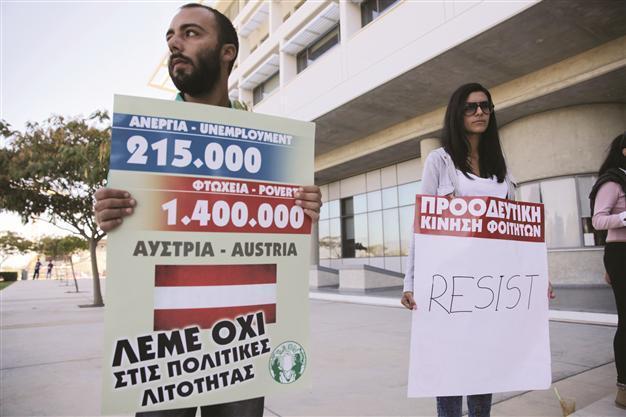Greek Cyprus observes positive trend in economy after EU bailout
NICOSIA - Agence France-Presse

A few Greek Cypriot protesters hold up banners against EU-imposed austerity measures during a visit to Greek Cyprus by EU President Herman Van Rompuy to discuss the conditions of a new package, at a university in Nicosia on Oct. 15, 2013. Greek writing on poster (L) reads: “We say No to Austerity Measures.” AFP photo
Greek Cyprus President Nicos Anastasiades said on Nov. 25 the economy was showing a positive trend after an EU bailout as it faced “huge challenges” ahead in boosting foreign investment and youth employment.Greek Cyprus earlier this month passed its second evaluation from a troika of international lenders in order to receive its next tranche of a 10-billion-euro ($13-billion) rescue package to bail out its troubled economy.
But the so-called troika - the European Commission, European Central Bank and International Monetary Fund (IMF) -- still expects the Greek Cypriot economy to contract 7.7 percent this year and 4.8 percent in 2014.
“To date we had two positive evaluations from the troika, something which demonstrates our full commitment to the timely implementation of the MOU (accord with the EU) in order to stabilize and restore trust in our economy,”Anastasiades told an economic conference in Nicosia.
“We are taking bold decisions to implement prudent fiscal policy, we are changing what must be changed and proceeding with large and bold structural changes. We are turning the crisis into an opportunity, we are trying at least.” he said.
“We still have huge challenges before us, and that is why we have to be daring, we have to be consistent, in order to restore as soon as possible the full confidence and trust in the Greek Cypriot banking system.” In return for the bailout, Greek Cyprus agreed to a raft of painful reforms, including a massive downsizing of its banking sector.
Greek Cyprus agreed to wind down its second-largest bank -- Laiki -- and impose losses of 47.5 percent on bigger deposits in its under-capitalized largest lender, Bank of Cyprus.
The Greek Cypriot president said future steps would be aimed at boosting foreign investment and addressing the island’s soaring youth unemployment, but he offered few details.
Delegates at the conference organized by Britain’s The Economist magazine also paid tribute to the tough measures adopted by Greek Cypriot officials.
“Greek Cypriot authorities have demonstrated strong resolve to take very difficult but necessary decisions,” said Delia Velculescu, an official in the IMF’s European department.
“The economy has been more resilient than expected, with private consumption declining by less than expected and tourism and exports holding up.” Maarten Verwey, deputy director general for economic and financial affairs at the European Commission, also praised Greek Cyprus’s “better than expected” fiscal performance.
‘No substitute for further structural adjustment’
But he compared the crisis - in which the Greek Cyprus banks were heavily invested in risky Greek holdings -- to the ancient Greek myth of Icarus, who flew too close to the sun before plunging into the sea.
Verwey said the troika loans could “cushion the impact of this hard landing” but they were no substitute for further structural adjustment.
Greek Cyprus entered talks last week with Italian-South Korean venture ENI-KOGAS on licensing two offshore exploration blocks, state media said, as the recession-hit island steps up its search for gas reserves.
The cabinet reportedly gave the green light for the negotiations on blocks 5 and 6 to begin, with a December 2 deadline ready to be extended.
Greek Cyprus, which is treading a painful road to recovery from near economic meltdown earlier this year, is hoping to commercially export its gas, and maybe oil, by 2020.
Securing deals for blocks 5 and 6 would complete a second round of licensing and pave the way for a third to auction off the remaining blocks.
















